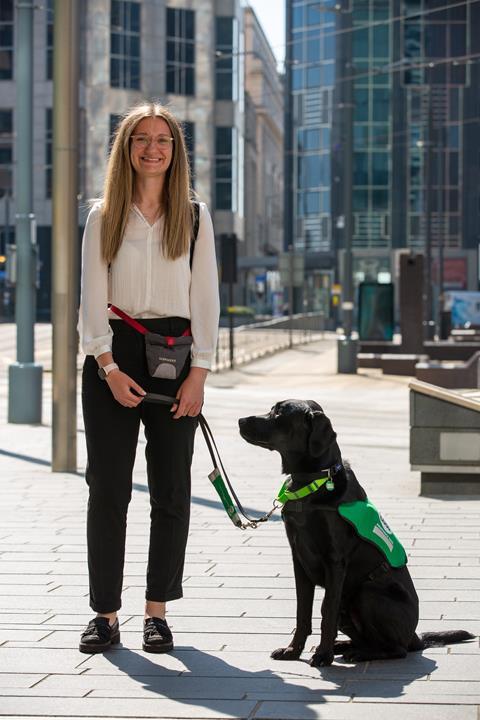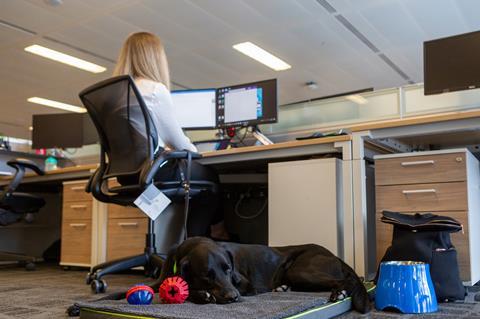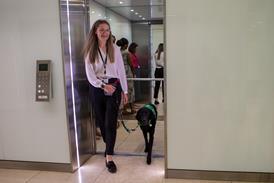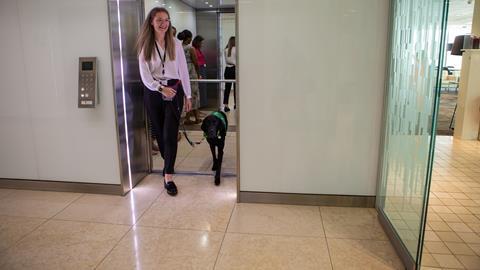Gowling WLG has pioneered the use of an assistance dog for legal apprentice Jemima Banks. Lauded by the Royal National Institute of Blind People, Jemima and the firm are working to get others interested
‘Albert has literally opened doors for me’
In the meeting room of a Birmingham law firm, an extra member has joined proceedings: Albert the dog.
Staying obediently by the side of legal apprentice Jemima Banks, Albert has kickstarted a new approach by Gowling WLG and potentially opened the door to other assistance dogs being welcomed into law firms.
Banks was in the process of getting an assistance dog to help with daily life when she applied to the firm for a job as a paralegal, attracted by a feature on the careers page about an associate with a disability.
She had become unwell while in sixth form and was diagnosed with Ehlers-Danlos Syndrome and Postural Orthostatic Tachycardia Syndrome. These cause chronic pain, dizziness, migraines, stomach problems, fatigue and joint dislocations.
Banks completed a health declaration as part of her Gowling application and said she would need to bring a dog into the office. The firm would also need written confirmation from the charity Dogs for Good, which had trained Albert, that it could accommodate the extra visitor and had a valid policy in place. This policy had to cover the firm’s approach, access rights and available support.

Yukimi Daule, senior HR adviser at Gowling, had never put together an assistance dog policy before but researched how other companies had managed it and applied those lessons to the firm.
‘One of the most important things we did from the start was to ask colleagues to let us know if anyone had any concerns about having an assistance dog in the office and there were, as expected, some people who flagged allergies and fears,’ said Daule. ‘We worked with these colleagues to understand how their allergy manifested and found solutions such as placing Jemima and Albert on a desk that was a little further away and suggestions such as not getting into the same lift.
‘For colleagues with a fear of dogs, we listened very closely as we recognise that this is a very real thing and can cause enormous distress.’
'Having an employer that has welcomed both Albert and me into the workplace means that I now have professional independence and a bigger, brighter future than before'
Not everything was about finding complex solutions. Banks struggled to open some doors in the office, and rather than install automatic doors, she advised putting in a rope that Albert could pull on to let her through.
‘The assistance dog policy makes everyone’s responsibilities clear,’ explained Banks. ‘Not everyone is comfortable around dogs, but the firm is there to support anyone with an allergy or fear of dogs.
‘Albert’s been through lots of training to be an assistance dog and, most of the time, when he’s in the office you wouldn’t even know he was there.’
Banks and Albert get the train to Birmingham together and he can help her take her coat off by pulling at the sleeves. He naps while she works and comes along to meetings. At lunchtime he goes out for a walk and a toilet break.
Staff have been told that when Albert has his Dogs for Good jacket on, he is working and is trained to ignore other people.
Small adjustments need to be made to the working day, but these are largely dealt with by a bit of advanced planning.
Banks said: ‘I might need somewhere to sit; Albert will need a quiet space to lie down next to me. It’s also really helpful to know the structure of an event in advance, so I can plan things like taking my medications, taking Albert out and whether there is going to be food that might be a distraction to a Labrador.’

Banks and Albert were guests of honour at last week’s Bristol Legal Awards. She and Gowling are working with Dogs for Good to share the assistance dog policy with other firms and ensure greater representation for people with a disability in the law (SRA data shows that the proportion of solicitors declaring a disability is much lower than for the working-age population at large).
Last year, Gowling was the first law firm to be recognised as a visibly better employer by the Royal National Institute of Blind People. The hope is that Albert may one day have some canine company in the office.
‘Having chronic pain and fatigue can be debilitating and isolating,’ said Banks. ‘Albert has quite literally opened doors for me, and he’s given me independence. I wouldn’t be doing my apprenticeship without him.
‘It is a small ripple for accessibility which is spreading to other organisations that adopt the policy. Having an employer that has welcomed both Albert and me into the workplace means that I now have professional independence and a bigger, brighter future than before.’
This article is now closed for comment.



















![Eleanor Clarke - 029[8]](https://d1d8vslyhr7rdg.cloudfront.net/Pictures/274x183/1/5/1/120151_eleanorclarke0298_527574_crop.jpg)














3 Readers' comments